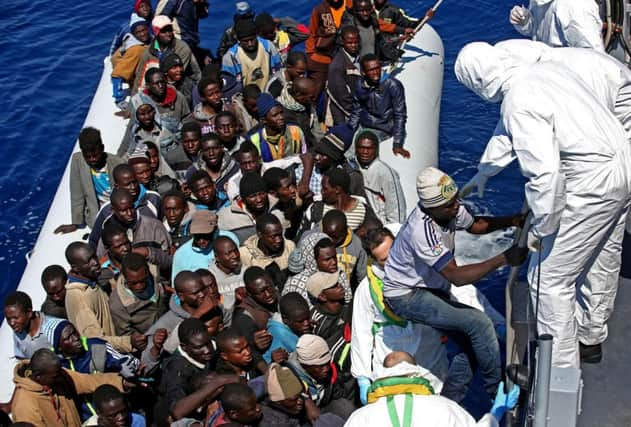David Cameron commits UK help in migrant crisis


Arriving at emergency EU talks in Brussels, the Prime Minster said he was offering to deploy navy flagship HMS Bulwark together with three helicopters and two border patrol vessels.
Mr Cameron stressed that Britain’s involvement had to take place under the “right conditions”, ensuring that migrants picked from the sea by the Royal Navy would not have the right to claim asylum in the UK.
Advertisement
Hide AdAdvertisement
Hide Ad“Today’s meeting has got to be about saving lives. Of course saving lives means rescuing these poor people but it also means smashing the gangs and stabilising the region. Britain as ever will help,” he said.
Britain would be able to contribute to all those operations in the right circumstances.
“That must include that the people we pick up and the people we deal with are taken to the nearest safe country – most likely Italy – and don’t have immediate recourse to claim asylum in the UK.
“When these tragedies happen Britain is always there and this time will be no exception.”
Bulwark – an assault ship – was yesterday in Turkey for the Gallipoli centenary commemorations and could deploy to the affected area relatively quickly.
The EU leaders gathered in the Belgian capital yesterday amid proposals to double the financial resources available for saving lives in the Mediterranean, where more than 1,700 migrants are feared to have died this year. The latest draft statement would pledge the 28 nations to “increase search and rescue possibilities” and to “undertake systematic efforts to identify, capture and destroy vessels before they are used by traffickers”.
It said EU foreign policy chief Federica Mogherini would immediately start preparing an operation that would probably have a military component.
Mr Cameron’s call for a “comprehensive approach” to the problem has been echoed by Italian prime minister Matteo Renzi, whose country has rescued hundreds of refugees after their overcrowded and unseaworthy vessels ran into trouble.
Advertisement
Hide AdAdvertisement
Hide AdItalian defence minister Roberta Pinotti called for refugee camps to be set up in countries bordering Libya, from where many of the boats sail, and said the Italian military was ready to hunt down the traffickers.
Yesterday’s summit was called after around 800 migrants were feared to have drowned when their boat capsized at the weekend off the coast of Libya in what the office of the United Nations High Commissioner for Refugees said was the “deadliest incident” it had recorded in the Mediterranean.
German chancellor Angela Merkel said as she arrived at the summit: “First and foremost now, we have to save lives and take the right measures to do so.”
German sources said Ms Merkel would offer to send the troop supply ship Berlin as well as frigates Karlsruhe and Hessen to Italy. The ships are currently participating in an anti-piracy operation, Atalanta, off the Horn of Africa and could be in the Mediterranean within five days.
Belgium has also committed a navy ship.
The task ahead is huge, with more than 10,000 plucked from the seas between Italy and Libya over the past week alone.
For several years, EU leaders have done little more than deplore the rising death toll and mark tragedies with moments of silence and wreaths instead of fundamental action.
Even optimists say any emergency measures agreed at the summit would not fully stem the tide of rickety ships crossing the Mediterranean.
“Europe is declaring war on smugglers,” said the EU’s top migration official, Dimitris Avramopoulos, who was in Malta to attend the funeral of 24 migrants who perished at sea.
Advertisement
Hide AdAdvertisement
Hide AdSo far, that has been a halfhearted skirmish, Guy Verhofstadt, leader of the EU parliament’s liberal ALDE group, said.
He complained the EU border operation Frontex had only two helicopters and seven ships in the Mediterranean. “We need a multitude out there,” he said.
The draft statement called for “a first voluntary pilot project on resettlement, offering at least 5,000 places to persons qualifying for protection”.
That resettlement plan would amount to about half the number which arrived in just the past week and a tiny fraction of the tens of thousands likely to arrive this year.
A rift was obvious, with countries such as Germany, Sweden, France and Italy dealing with a disproportionate number of asylum requests while many eastern member states hardly take any. Five of the 28 members are handling almost 70 per cent of the migrants coming in. In a joint statement, the UN’s top refugee and migration officials called for an EU-wide resettlement plan and the beefing up of the capacity of front-line countries Greece, Italy and Malta to receive more migrants.
The draft statement also proposed cutting the time needed to process would-be migrants – which can now take up to a year before a person is deemed legitimate to stay – to as little as two months.
Some politicians are concerned the leaders may stump up rescue assets while the media spotlight is on their summit but that commitments to solidarity could quickly fade away, as they have in the past.
“I fear that what will happen is that they will try to water down a few of the points and the actual reason why they are meeting – to urgently seek solutions to what is happening today – will not be the focus of the deal,” Roberta Metsola, the leading EU parliamentarian on migration, said.
According to the UN’s refugee agency, 219,000 refugees and migrants crossed the Mediterranean last year, and at least 3,500 died trying.